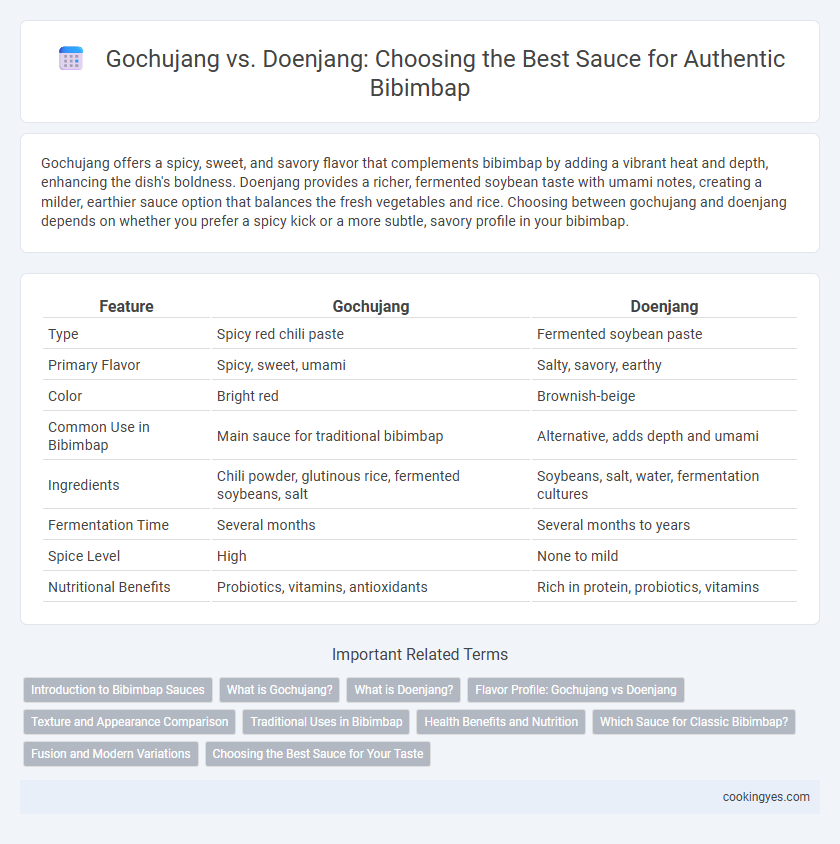Gochujang offers a spicy, sweet, and savory flavor that complements bibimbap by adding a vibrant heat and depth, enhancing the dish's boldness. Doenjang provides a richer, fermented soybean taste with umami notes, creating a milder, earthier sauce option that balances the fresh vegetables and rice. Choosing between gochujang and doenjang depends on whether you prefer a spicy kick or a more subtle, savory profile in your bibimbap.
Table of Comparison
| Feature | Gochujang | Doenjang |
|---|---|---|
| Type | Spicy red chili paste | Fermented soybean paste |
| Primary Flavor | Spicy, sweet, umami | Salty, savory, earthy |
| Color | Bright red | Brownish-beige |
| Common Use in Bibimbap | Main sauce for traditional bibimbap | Alternative, adds depth and umami |
| Ingredients | Chili powder, glutinous rice, fermented soybeans, salt | Soybeans, salt, water, fermentation cultures |
| Fermentation Time | Several months | Several months to years |
| Spice Level | High | None to mild |
| Nutritional Benefits | Probiotics, vitamins, antioxidants | Rich in protein, probiotics, vitamins |
Introduction to Bibimbap Sauces
Gochujang, a spicy fermented red chili paste, is the most popular sauce for bibimbap, providing a bold, savory, and slightly sweet flavor that complements the mixed rice and vegetables. Doenjang, a fermented soybean paste, offers a richer, earthier taste with umami depth, often used for a milder, savory alternative to enhance the overall dish. Both sauces are essential in Korean cuisine, each adding unique flavor profiles that define traditional and modern variations of bibimbap.
What is Gochujang?
Gochujang is a traditional Korean fermented red chili paste made from chili powder, glutinous rice, fermented soybeans, and salt, providing a spicy, sweet, and savory flavor essential to bibimbap. This thick paste adds depth and heat, enhancing the dish's overall taste profile while balancing the mildness of vegetables and rice. Unlike doenjang, which offers a strong umami and saltiness from fermented soybeans, gochujang contributes vibrant color and a signature kick crucial for authentic bibimbap sauces.
What is Doenjang?
Doenjang is a traditional Korean fermented soybean paste known for its rich umami flavor and depth, often used as a base in sauces and soups. In bibimbap, doenjang provides a savory, earthy taste that contrasts with the spicy sweetness of gochujang. Its complex fermentation process enhances nutritional benefits, including probiotics, making it a flavorful and healthful alternative to the chili pepper-based gochujang.
Flavor Profile: Gochujang vs Doenjang
Gochujang offers a bold, spicy, and slightly sweet flavor with fermented chili pepper as its key ingredient, giving bibimbap a vibrant heat and depth. Doenjang, made from fermented soybeans, provides a rich, savory, and earthy taste, adding umami complexity without the spiciness. Choosing between gochujang and doenjang drastically influences bibimbap's overall flavor profile, catering to preferences for either a fiery or mellow sauce.
Texture and Appearance Comparison
Gochujang offers a thick, sticky texture with a vibrant red color that creates a visually striking contrast when dolloped atop bibimbap. Doenjang has a chunkier, grainy consistency with a muted brown hue that blends more subtly into the mixed rice and vegetables. The glossy finish of gochujang enhances the dish's appeal, while doenjang's matte appearance gives bibimbap a rustic, earthy look.
Traditional Uses in Bibimbap
Gochujang, a spicy red chili paste, is traditionally used in bibimbap to add heat and depth of flavor, enhancing the dish's signature bold, savory taste. Doenjang, a fermented soybean paste, offers a milder, umami-rich profile and is occasionally used as a contrasting sauce to provide earthiness and subtle saltiness. In classic bibimbap preparations, gochujang remains the dominant condiment for achieving the authentic balance of spice and sweetness.
Health Benefits and Nutrition
Gochujang, a fermented red chili paste, is rich in capsaicin and probiotics, boosting metabolism and supporting digestive health, making it a spicy, healthful option for bibimbap. Doenjang, a fermented soybean paste, offers high protein content and essential amino acids, along with antioxidants that enhance immune function and promote gut health. Both sauces provide beneficial nutrients, but Gochujang's metabolism-enhancing properties contrast with Doenjang's emphasis on protein and antioxidant intake, allowing for tailored health benefits in bibimbap preparations.
Which Sauce for Classic Bibimbap?
Gochujang is the preferred sauce for classic bibimbap due to its spicy, sweet, and savory flavor profile that complements the mixed rice and vegetables. Doenjang, a fermented soybean paste, offers a deeper, earthier taste more suited for soups and stews rather than the vibrant flavors of traditional bibimbap. For an authentic bibimbap experience, gochujang's balanced heat and sweetness elevate every bite, enhancing the dish's signature harmony.
Fusion and Modern Variations
Gochujang, a spicy fermented red chili paste, remains the classic choice for bibimbap, providing a bold heat that elevates the dish's flavors, while doenjang, a deeply savory fermented soybean paste, offers a milder, umami-rich alternative in modern fusion variations. Contemporary chefs increasingly blend both sauces or incorporate non-traditional ingredients like garlic aioli or miso to create innovative bibimbap sauces that cater to diverse palates. These modern adaptations highlight the versatility of bibimbap, balancing traditional Korean fermentation with global flavor profiles to appeal in fusion cuisine.
Choosing the Best Sauce for Your Taste
Gochujang offers a spicy, sweet, and savory flavor that enhances bibimbap with its signature red chili paste, making it ideal for those who prefer a bold and vibrant taste. Doenjang, a fermented soybean paste, provides a richer, deeper umami profile that complements bibimbap with a more subtle, earthy flavor. Selecting between gochujang and doenjang depends on your preference for heat and sweetness versus a mellow, fermented savoriness to best balance the ingredients in your bibimbap.
Gochujang vs Doenjang for bibimbap sauces Infographic

 cookingyes.com
cookingyes.com